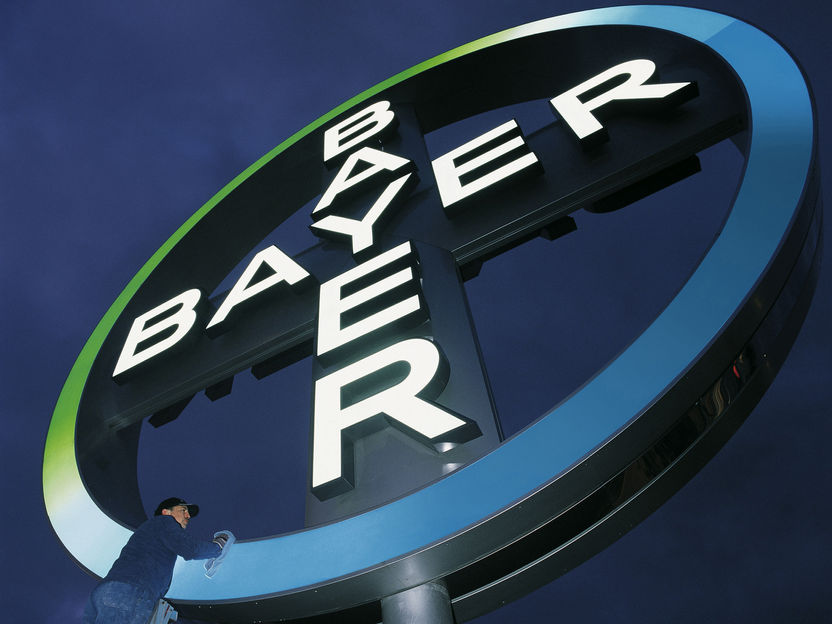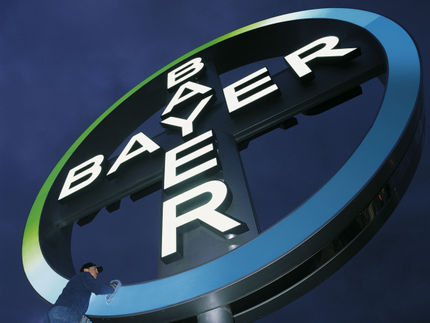Bayer: Slow start to the year as expected
Bayer Group business performance in the first quarter of 2023
Advertisement
The Bayer Group experienced a slow start to 2023 as expected. “Sales were on a par with the exceptionally strong prior-year quarter,” CEO Werner Baumann said on Thursday when presenting the Quarterly Statement for the first quarter. The normalization in the glyphosate business has accelerated, although this effect was largely offset by growth in the other parts of the Crop Science business, he explained. The Pharmaceuticals Division saw its new products perform very well, while sales in China were heavily impacted by tender procedures and pandemic-related effects. Group earnings were mainly weighed down by the glyphosate business and inflation, and were also impacted by R&D investment at Pharmaceuticals, which remained high.

Bayer AG
Baumann confirmed the Group outlook for full-year 2023 based on the average monthly exchange rates from 2022. However, for the remainder of the year Bayer sees potential risks mainly arising from the significantly reduced market price expectations for glyphosate-based products, he said. “We continue to expect performance to improve in our other businesses in the second half of the year,” Baumann noted. “Overall, we expect target attainment to come in at the lower end of our guidance.”
Group sales came in at 14.389 billion euros in the first quarter of 2023, down 1.1 percent on a currency- and portfolio-adjusted basis (Fx & portfolio adj.). Sales benefited from a positive currency effect of 102 million euros (Q1 2022: 529 million euros). EBITDA before special items declined by 14.9 percent to 4.471 billion euros. EBIT fell by 29.4 percent to 2.973 billion euros after net special charges of 431 million euros (Q1 2022: net special gains of 40 million euros). The special charges primarily comprised an impairment loss due to significantly reduced market price expectations for glyphosate. Net income decreased by 33.8 percent to 2.178 billion euros, while core earnings per share were down 16.4 percent at 2.95 euros.
Free cash flow came in at minus 4.102 billion euros (Q1 2022: minus 1.187 billion euros). This figure included higher payments to resolve proceedings in the litigations surrounding glyphosate, dicamba, Essure™ and, in particular, PCBs that had already been communicated and were effected in the first quarter. The net payout amounted to 1.536 billion euros (Q1 2022: 476 million euros) and was covered by provisions. As a result, net financial debt as of March 31, 2023, came in at 36.077 billion euros, up 13.4 percent from year-end 2022.
Crop Science grows outside the glyphosate business
In the agricultural business (Crop Science), sales declined by 1.1 percent (Fx & portfolio adj.) to 8.351 billion euros. Excluding the glyphosate business, Crop Science sales were up around 8 percent (Fx & portfolio adj.). The division recorded double-digit percentage gains in the Europe/Middle East/Africa and Asia/Pacific regions, but saw sales fall in Latin and North America, mainly due to lower volumes. Sales at Herbicides decreased by 24.3 percent (Fx & portfolio adj.) due to lower volumes and prices for glyphosate-based products. By contrast, Corn Seed & Traits saw sales rise by a substantial 15.8 percent (Fx & portfolio adj.), primarily driven by higher prices in the North America and Europe/Middle East/Africa regions. Sales at Insecticides rose by 12.6 percent (Fx & portfolio adj.), with significant price and volume increases in Europe/Middle East/Africa thanks to Movento™ and in Latin America due to Curbix™ more than offsetting lower volumes in North America. Sales were also up at Soybean Seed & Traits, which registered growth of 1.4 percent (Fx & portfolio adj.) that was mainly driven by higher volumes in Latin America. Sales at Fungicides came in at the prior-year level, with higher prices in all regions offsetting lower volumes in Latin and North America in particular.
EBITDA before special items at Crop Science decreased by 11.0 percent to 3.267 billion euros, mainly due to the fall in sales in Latin and North America. Earnings were also diminished by an increase in particular in the cost of goods sold, which was due to high inflation. There was a positive currency effect of 54 million euros (Q1 2022: 98 million euros). The EBITDA margin before special items declined by 4.3 percentage points to 39.1 percent.
Pharmaceuticals sales benefit from new products
Sales of prescription medicines (Pharmaceuticals) fell by 3.1 percent (Fx & portfolio adj.) to 4.407 billion euros, mainly due to tender procedures and pandemic-related developments in China. Due to these effects, sales of the oral anticoagulant Xarelto™ and the heart disease treatment Adalat™ in particular were down, with declines of 12.8 percent and 23.9 percent (Fx & portfolio adj.), respectively. By contrast, the successful market launch of new products continued to generate significant gains. Sales of the cancer drug Nubeqa™ more than doubled, while Kerendia™, a product for the treatment of patients with chronic kidney disease associated with type 2 diabetes, registered an even stronger growth rate. In addition, the Radiology business continued to achieve strong gains with the CT Fluid Delivery, Gadovist™ and Ultravist™ product lines. Despite declining prices, sales of the ophthalmology drug Eylea™ also advanced, with growth of 4.5 percent (Fx & portfolio adj.) driven by higher volumes in North and Latin America in particular.
EBITDA before special items at Pharmaceuticals decreased by 20.4 percent to 1.106 billion euros, mainly due to lower sales. The division also increased its R&D investments in cell and gene therapy and chemoproteomics technologies, as well as in projects in advanced clinical development. In addition, procurement prices rose due to inflationary pressures. There was a negative currency effect of 6 million euros (Q1 2022: 34 million euros). The EBITDA margin before special items declined by 4.9 percentage points to 25.1 percent.
Consumer Health continues to grow as business remains at high level
Sales of self-care products (Consumer Health) rose by 4.1 percent (Fx & portfolio adj.) to 1.573 billion euros, on top of significant growth in the first quarter of 2022. Growth was slowed by temporary supply constraints in North America and Europe/Middle East/Africa. However, business remained up in three out of four regions. Sales of Allergy & Cold products advanced by 15.9 percent (Fx & portfolio adj.) against the very strong prior-year quarter due to the launch of the Astepro™ antihistamine nasal spray in the United States and continuously elevated cold incidence rates. The Dermatology business also registered double-digit percentage gains, with growth of 10.3 percent (Fx & portfolio adj.), partly driven by continued strong demand for Bepanthen™. By contrast, sales in the Nutritionals category declined by 10.0 percent (Fx & portfolio adj.) but remained at a high level following significant growth over the past three years.
EBITDA before special items at Consumer Health decreased by 2.3 percent to 379 million euros. This follows a particularly strong prior-year first quarter, as well as additional effects from significant inflation-related cost increases and investments in marketing innovative products, especially Astepro™. However, the division was largely able to offset these effects thanks to continuous cost and price management efforts. Income from the sale of minor, nonstrategic brands was lower than in the prior-year quarter. There was a negative currency effect of 4 million euros (Q1 2022: positive currency effect of 6 million euros). The EBITDA margin before special items declined by 1.6 percentage points to 24.1 percent.
Sustainability: landmark renewable energy deal
In a bid to bolster its sustainability efforts, Bayer has inked a landmark deal with the company Cat Creek Energy in the United States as it looks to become climate-neutral in its own operations by 2030. The agreement will secure 40 percent of Bayer’s global and 60 percent of Bayer’s US-purchased electricity demand out of renewable sources. This project will generate a total of 1.4 terawatt hours of clean electricity annually, an amount equal to the energy consumption of 150,000 households in the United States. The deal also enables the company to reduce its annual CO2 emissions by 370,000 tons. That is roughly equivalent to the emissions of 270,000 mid-sized cars, or the amount that 31.7 million trees are capable of binding annually. The agreement with Cat Creek Energy marks one of the biggest single renewable energy deals in the United States.























































